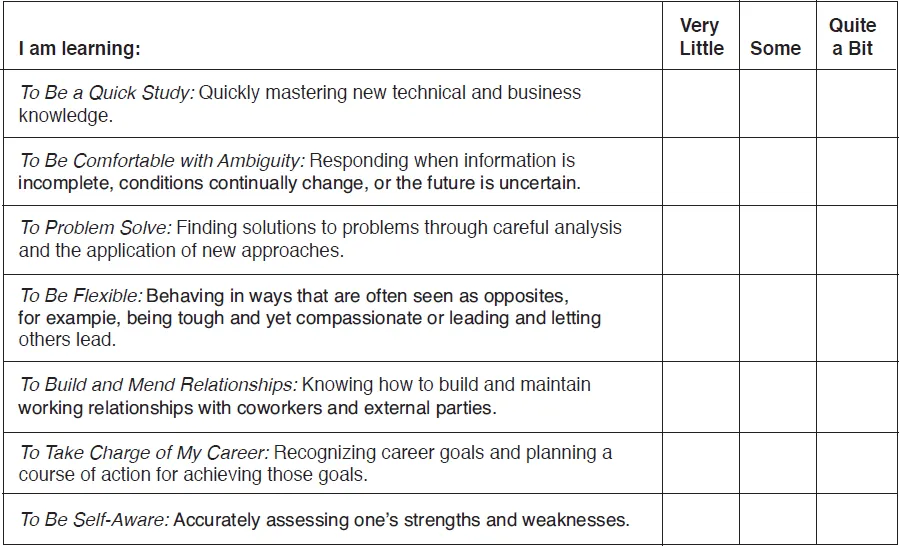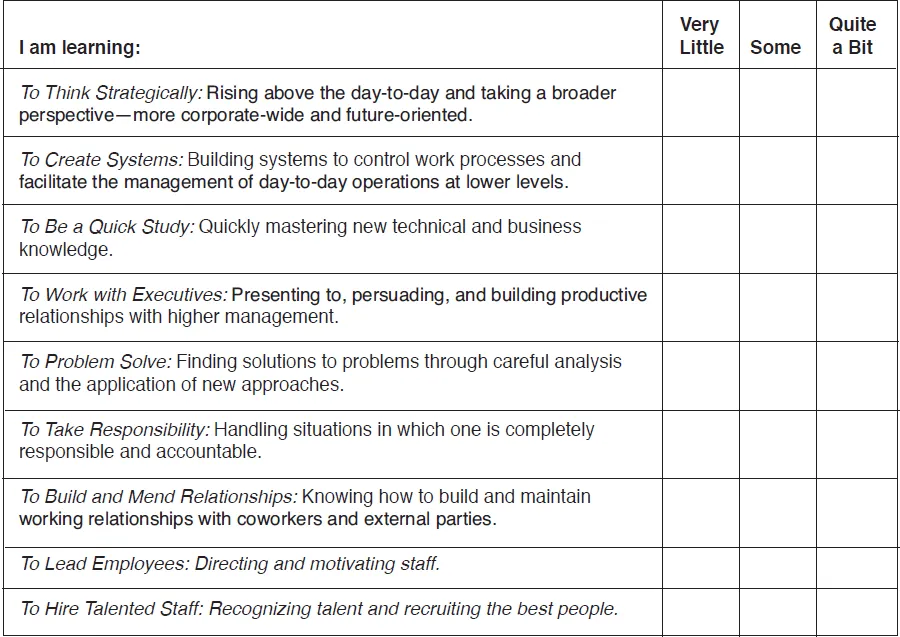
eBook - ePub
Job Challenge Profile Participant Workbook
Cynthia D. McCauley
This is a test
Condividi libro
- 49 pagine
- English
- ePUB (disponibile sull'app)
- Disponibile su iOS e Android
eBook - ePub
Job Challenge Profile Participant Workbook
Cynthia D. McCauley
Dettagli del libro
Anteprima del libro
Indice dei contenuti
Citazioni
Informazioni sul libro
The Job Challenge Profile (JCP) Participant Workbook is used to support the the self-scoring Job Challenge Survey. The JCP Survey is a tool designed for managers and executives to help them understand and use their job assignments as opportunities to develop valuable skills. The Participant Workbook is a resource to be used by those taking the Survey.
Domande frequenti
Come faccio ad annullare l'abbonamento?
È semplicissimo: basta accedere alla sezione Account nelle Impostazioni e cliccare su "Annulla abbonamento". Dopo la cancellazione, l'abbonamento rimarrà attivo per il periodo rimanente già pagato. Per maggiori informazioni, clicca qui
È possibile scaricare libri? Se sì, come?
Al momento è possibile scaricare tramite l'app tutti i nostri libri ePub mobile-friendly. Anche la maggior parte dei nostri PDF è scaricabile e stiamo lavorando per rendere disponibile quanto prima il download di tutti gli altri file. Per maggiori informazioni, clicca qui
Che differenza c'è tra i piani?
Entrambi i piani ti danno accesso illimitato alla libreria e a tutte le funzionalità di Perlego. Le uniche differenze sono il prezzo e il periodo di abbonamento: con il piano annuale risparmierai circa il 30% rispetto a 12 rate con quello mensile.
Cos'è Perlego?
Perlego è un servizio di abbonamento a testi accademici, che ti permette di accedere a un'intera libreria online a un prezzo inferiore rispetto a quello che pagheresti per acquistare un singolo libro al mese. Con oltre 1 milione di testi suddivisi in più di 1.000 categorie, troverai sicuramente ciò che fa per te! Per maggiori informazioni, clicca qui.
Perlego supporta la sintesi vocale?
Cerca l'icona Sintesi vocale nel prossimo libro che leggerai per verificare se è possibile riprodurre l'audio. Questo strumento permette di leggere il testo a voce alta, evidenziandolo man mano che la lettura procede. Puoi aumentare o diminuire la velocità della sintesi vocale, oppure sospendere la riproduzione. Per maggiori informazioni, clicca qui.
Job Challenge Profile Participant Workbook è disponibile online in formato PDF/ePub?
Sì, puoi accedere a Job Challenge Profile Participant Workbook di Cynthia D. McCauley in formato PDF e/o ePub, così come ad altri libri molto apprezzati nelle sezioni relative a Business e Leadership. Scopri oltre 1 milione di libri disponibili nel nostro catalogo.
Informazioni
Argomento
BusinessCategoria
LeadershipSECTION II
Capitalizing on the Learning Potential of Your Job
IN THIS SECTION OF YOUR WORKBOOK, you will examine the learning potential of job components that are particularly relevant for your job in more detail. A summary page is provided for each of the components that provides:
• A description of the job component;
• The managerial skills and perspectives that are most frequently developed from this component; and
• Strategies for getting the most from this component.
At the end of this section, you will be encouraged to consider three additional development strategies—feedback, relationships, and training—to maximize learning in your current job.
Keep in mind as you look at some of the specific developmental components of your job that the same components of your job that offer you the opportunity to learn and grow may also cause you stress and frustration. If you feel discouraged about any aspects of your job that are labeled “challenging,” take heart, as these feelings often accompany learning. Some powerful lessons come from dealing with frustrating situations. One method of dealing with these feelings is to talk to others about the situation. Peers, people who have formerly held your job, mentors, or spouses can help you find the learning points during discouraging moments.
Directions for completing this section:
1. Pick the developmental job components that seem the most important for you, using one or more of the following criteria:
• You rated the component as “quite descriptive” to “extremely descriptive” of your job, that is, your actual score is 20 or higher for the component;
• Your relative score on the component is high; or
• You feel particularly challenged by this component of your job.
2. Work through the summary page for each component you chose in Step 1 above. The page numbers are given below for each component:
• Unfamiliar Responsibilities | 11 |
• New Directions | 13 |
• Inherited Problems | 15 |
• Problems with Employees | 17 |
• High Stakes | 19 |
• Scope and Scale | 21 |
• External Pressure | 23 |
• Influence Without Authority | 25 |
• Work Across Cultures | 27 |
• Work Group Diversity | 29 |
3. When you have finished examining the job components of particular relevance to you, review the section on Linking the Developmental Power of Your Job with Learning Strategies on page 31.
4. Finally, complete the Summary Worksheet on page 34.
Unfamiliar Responsibilities
Description
You are expected to handle responsibilities that are new or very different for you. This is most likely the result of a job move (a promotion, a transfer, or a move to a new organization), but can also be experienced when a job is redefined due to organizational restructuring, strategic changes in the business, or new work technologies.
This component is characterized by the following:
• A lack of experience in some aspect of the job;
• A noticeable change from the type of work done previously; and
• A lack of background or credentials expected from someone in this position.
Learning Opportunities
If unfamiliar responsibilities are an important aspect of your job, you have the opportunity to learn, particularly in the areas listed in the table below. Do a quick assessment of the degree to which you are learning from unfamiliar responsibilities and fill in the corresponding boxes.

Gaining the Most from Unfamiliar Responsibilities
Do not ignore the new aspects of your job. It is not unusual for a manager to begin a new assignment by focusing most of his or her attention on the familiar parts of the job. Resist this tendency by forcing yourself to spend time on aspects of the job on which you may have a lower comfort level.
Do not be intimidated by a lack of experience. Trial-and-error learning is necessary. Jump in and start learning by doing. Do not let fear that you won’t do something right the first time immobilize you. As a matter of fact, chances are pretty good that you won’t do it exactly right (that’s why they call it trial-and-error learning). Make your mistakes now. Coworkers are more likely to forgive those who are clearly inexperienced.
Discover the tacit responsibilities in the job—aspects that no one explicitly told you about when you took the job. For example, you may be expected to see that positive relationships are maintained between your group and the other department that shares the same floor of the building or your boss may expect you to act on her behalf when she is out of the office. These tacit responsibilities may also be unfamiliar responsibilities to be mastered.
New Directions
Description
You are responsible for initiating and carrying out something new for the organization, such as a new venture, a new strategic direction, a new process, a new unit, or a new function. There is a need to explore, create, build, and expand.
This component is characterized by the following:
• Something the organization has not tried before;
• Unknown outcomes; and
• A need for new staff, new policies, and new procedures.
Learning Opportunities
If new directions are an important aspect of your job, you have the opportunity to learn, particularly in the areas listed in the table below. Do a quick assessment of the degree to which you are learning from new directions and fill in the corresponding boxes.

Gaining the Most from New Directions
Be clear about where you are he...